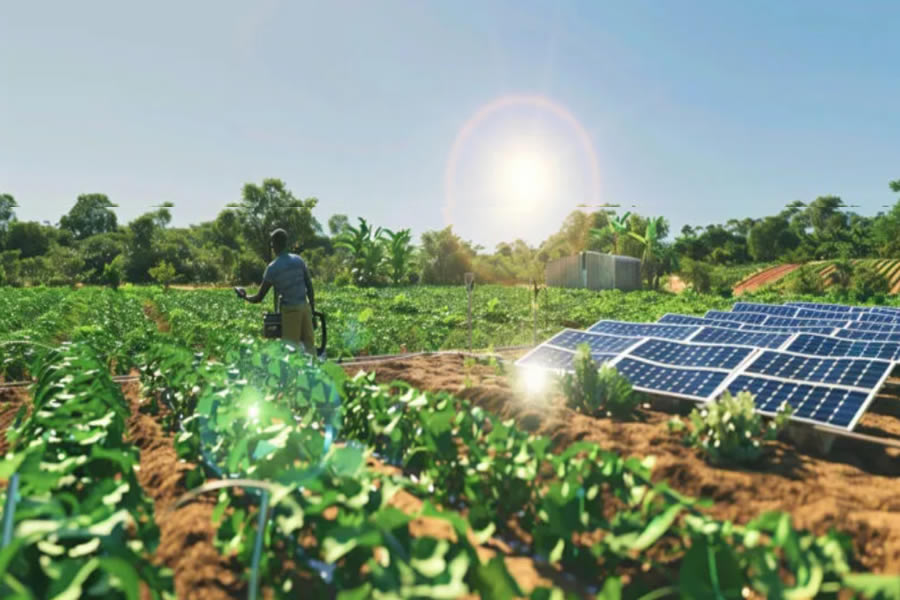Agriculture remains the backbone of Nigeria’s economy, employing millions of people and feeding the nation. Yet, many smallholder farmers still rely on traditional methods that limit productivity and income. The good news is that modern, smart farming techniques are no longer the preserve of large commercial farms. With the right knowledge and tools, small-scale farmers in Nigeria can adopt affordable practices that boost yields, cut costs, and improve food security.
Here are smart farming techniques Nigerian smallholders can start using today.
1. Mobile-Based Advisory Services
Most smallholder farmers own basic mobile phones, which can be powerful tools for farming. Platforms like Farmcrowdy, AgroMall, and government extension apps provide weather forecasts, pest alerts, and market prices. By accessing timely information, farmers can plan better, avoid crop losses, and sell at fairer prices.
2. Drip Irrigation for Water Efficiency
Water scarcity is a recurring challenge, especially in northern Nigeria. Instead of traditional flooding methods, drip irrigation delivers water directly to plant roots, reducing waste by up to 60%. Low-cost drip kits are now available and can be adapted for small farms.
3. Improved Seed Varieties
Switching to high-yield, drought-resistant, or pest-resistant seeds can dramatically increase output. Research institutes like IITA (International Institute of Tropical Agriculture) and National Agricultural Seeds Council (NASC) offer improved maize, rice, cassava, and soybean varieties suited to Nigeria’s climate.
4. Soil Testing and Fertility Management
Many farmers apply fertilizers blindly, leading to waste and poor results. Simple soil testing kits, now available through cooperatives and extension workers, help farmers know exactly what nutrients their land needs. This ensures better use of fertilizer and healthier crops.
5. Organic and Natural Pest Control
Instead of relying solely on expensive chemical pesticides, farmers can use affordable alternatives like neem extracts, ash, or intercropping techniques that repel pests naturally. These methods reduce costs and protect soil health.
6. Post-Harvest Storage Solutions
A major cause of farmer losses in Nigeria is poor storage. Smart techniques such as hermetic storage bags (e.g., PICS bags) and solar dryers help reduce spoilage of grains, fruits, and vegetables. This means farmers can sell when prices are better, instead of rushing crops to market immediately.
7. Cooperative Mechanisation
While owning tractors or threshers may be out of reach for smallholders, farmers can form cooperatives to rent machinery at affordable rates. Mechanisation saves time, improves efficiency, and reduces labour costs.
8. Access to Digital Marketplaces
Selling through middlemen often robs farmers of fair profits. Digital platforms like ThriveAgric, AFEX, and AgroEknor connect farmers directly to buyers, processors, and exporters. Even social media platforms like WhatsApp and Facebook are increasingly being used to market farm produce.
9. Climate-Smart Farming
Climate change is affecting rainfall patterns and yields. Techniques such as mulching, cover cropping, and crop rotation help conserve soil moisture, reduce erosion, and improve resilience against droughts and floods.
10. Financial Inclusion through Microcredit and Insurance
Smart farming is not just about technology but also about managing risks. Farmers can now access microloans via fintech platforms and agricultural banks, while insurance schemes like NAIC (Nigerian Agricultural Insurance Corporation) protect them against crop failures.
The Concluding Part
Smart farming does not always mean expensive machines or high-tech gadgets. For Nigerian smallholders, it’s about using affordable, practical techniques to increase productivity and income. From mobile advisory tools to improved storage methods, these practices can transform small farms into profitable ventures.
If widely adopted, these techniques will not only uplift farmers but also strengthen Nigeria’s food security and reduce dependence on imports.

